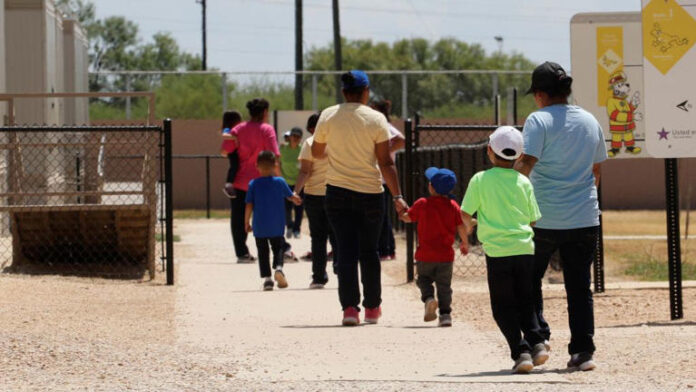
Core Insights:
- Legal Challenge Emerges: Immigration attorneys filed a critical lawsuit to preserve the Flores Settlement Agreement, which has protected detained migrant children since the 1990s
- Alarming Conditions Exposed: Testimony reveals severe medical neglect, water scarcity, and deteriorating conditions at Texas detention facilities housing families
- Escalating Detention Crisis: With ICE arrests planned to increase from 650 to 3,000 daily, advocates warn of catastrophic overcrowding in already strained facilities
By Samuel Lopez – USA Herald
A coalition of immigration attorneys launched a high-stakes legal battle late Friday, filing a lawsuit designed to prevent the Trump administration from dismantling decades-old protections for immigrant children held in federal custody. The legal challenge comes as disturbing testimony emerges from detention facilities across Texas, painting a grim picture of medical neglect and substandard conditions affecting some of America’s most vulnerable populations.
The lawsuit centers on preserving the Flores Settlement Agreement (FSA), a landmark accord from the 1990s that has served as the cornerstone of protection for detained immigrant children. This agreement established crucial oversight mechanisms, mandated facility visits, and imposed strict limits on how long children can remain in federal custody.
Immigration advocates from the National Center for Youth Law, the Center for Human Rights and Constitutional Law, RAICES, and Children’s Rights conducted extensive interviews with detainees and site visits to family detention centers in Dilley and Karnes, Texas. Their findings form the backbone of Friday’s legal filing, which seeks to block the administration’s efforts to terminate the FSA entirely.
The timing proves particularly critical as Congress weighs President Trump’s “Big Beautiful Bill,” which allocates $45 billion over four years to dramatically expand migrant detention capabilities—a threefold increase in spending that has sparked divisions even within Republican ranks.
The lawsuit reveals deeply troubling conditions at facilities operated by private detention corporations CoreCivic and Geo Group. Among the most shocking allegations: a young boy with cancer missed critical medical appointments after his family’s detention following an immigration court hearing. Meanwhile, a 9-month-old baby has reportedly lost over eight pounds during the past month in custody, and a 12-year-old boy remains largely unable to walk due to a blood condition that caused severe swelling in his feet—yet he was denied follow-up medical testing.
Water access emerged as a recurring crisis. Court documents describe a mother forced to use tap water for her 9-month-old’s formula, resulting in three days of diarrhea. In another instance, a 16-year-old girl described adults pushing her younger sister away during water distribution due to severe scarcity.
“We don’t get enough water,” the teenager—currently held with her mother and two younger siblings at the Karnes County Immigration Processing Center—stated in a sworn declaration. “They put out a little case of water, and everyone has to run for it.”
In May, federal agencies including the Department of Justice, Department of Homeland Security, and Department of Health and Human Services petitioned a Los Angeles federal court to terminate the Flores Settlement Agreement. Trump administration officials frame the decades-old agreement as an obstacle to effective immigration enforcement.
“For years, the Flores consent decree has been a tool of the Left to promote an open borders agenda,” said a senior DHS official. “It is long overdue for a single district in California to stop managing the Executive Branch’s immigration functions. The Trump administration is committed to restoring common sense to our immigration system.”
The administration argues that new federal standards for migrant child care render the FSA obsolete. Justice Department officials contend that the original agreement, designed for unaccompanied minors, has been inappropriately expanded to protect family units—a loophole they claim human smugglers exploit.
The legal challenge unfolds against a backdrop of rapidly expanding detention operations. White House Deputy Chief of Staff Stephen Miller has outlined plans to increase ICE arrests from approximately 650 per day to at least 3,000—a nearly five-fold increase that will strain an already overwhelmed system.
According to the National Immigrant Justice Center, more than 200 facilities across the United States currently house detained migrants. However, Department of Homeland Security officials reported in March that detention facilities nationwide had already reached capacity, raising serious questions about the feasibility of the administration’s expansion plans.
Leecia Welch, deputy legal director at Children’s Rights, warns of deteriorating conditions as deportation efforts intensify. “As of early June, the census at Dilley was around 300 and only two of its five areas were open,” Welch explained. “With a capacity of around 2,400—it’s hard to imagine what it would be like with 2,000 more people.”
These problems represent a continuation of longstanding issues within the detention system. In 2019, a mother filed suit against CoreCivic after her 18-month-old daughter died following three weeks at the company’s Dilley facility. The current allegations mirror conditions recently detailed in an American Civil Liberties Union letter regarding a Kansas facility, as well as accusations in a proposed class-action lawsuit in Baltimore targeting ICE’s detention practices.
Mishan Wroe, a senior immigration attorney at the National Center for Youth Law, emphasized the urgency of preserving FSA protections: “At a time when Congress is considering funding the indefinite detention of children and families, defending the Flores Settlement is more urgent than ever.”
The lawsuit’s outcome carries significant political and economic ramifications. Senator Rand Paul of Kentucky, who chairs the Senate Homeland Security and Governmental Affairs panel, has emerged as a key skeptic of the immigration provisions’ massive price tag, potentially complicating the administration’s funding requests.
Under Secretary Kristi Noem’s leadership, the Department of Homeland Security has recently restricted congressional oversight of detention facilities, requiring lawmakers to provide advance notice before facility visits.


